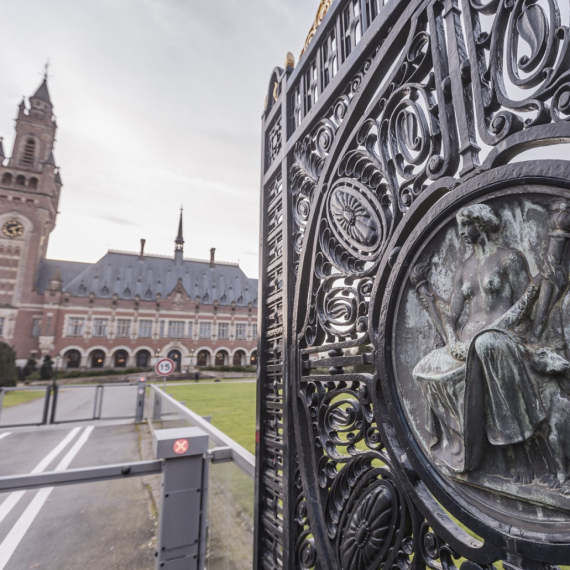Regaining confidence in European idea
Tuesday, 04.02.2014.
11:55

Regaining confidence in European idea
Of the 28 EU member states, arguably none have had as rough a ride economically as Greece did post-crash. Austerity measures and structural changes have come at a heavy cost to citizens, but with a new year comes the country’s reascendency to the EU Presidency and the hope for better days ahead at home and in EuropeGreece, or the Hellenic Republic as it is officially known, has experienced a turbulent few years. As the country’s Ambassador to Serbia H.E. Mr. Constantine Economides points out, Greece saw 25% of its GDP wiped out following the global financial crash and its own economic collapse, which saw the country being bailed out by its EU peers ahead of extensive economic restructuring. Unemployment remains high and civil unrest has been an issue, with extremist political parties such as Golden Dawn coming to prominence. But Economides is quick to praise the hardiness of the Greek people in the face of such challenges, and insists that the country is now on the right track and ready to lead from the front as it assumes the EU Presidency for the fifth time.
The Hellenic Republic assumed the duties of the EU Presidency on 1 January. What will be the priorities during the Presidency?
- The Presidency of the EU is the fifth Presidency of the Council of the EU that the Hellenic Republic has assumed after its accession to the European Communities in 1981. It is noticeable that every Hellenic Presidency has been linked historically with significant steps in the European integration process, namely the enlargement of the European Union and efforts to adopt the European Constitution in 2003, which led to the adoption of a revised document entitled the Treaty of Lisbon, the institutional foundation of the EU.
Our Presidency will focus primarily on four policy areas: 1) growth, jobs, cohesion; 2) integration of the EU and eurozone; 3) migration, borders, mobility; and 4) an integrated maritime policy. With respect to growth and employment, let me point out that 2014 will mark the start of a new seven-year macroeconomic programming period, during which it will be of paramount importance to reverse negative employment trends at a European level, especially in the youth sector, and boost job creation with the adoption of growth-enhancing policies.
At the same time, the deepening of the new EMU (economic and monetary union) architecture remains a key priority for each EU rotating presidency, and the main focus will be on the improvement of economic governance, the promotion of the banking union and the establishment of the deposit guarantee mechanism. Integration of the EU and the eurozone means further promotion of the banking union. It means effective implementation of EU economic governance mechanisms. Equally, it entails focusing on the social dimension of the EMU and promoting the strengthening of our European institutional structures, which will ensure transparency, accountability, national ownership and credibility towards the citizens of Europe.
Our third priority comes hand in hand with the principle of growth. We need to protect the common European borders, to manage migration flows jointly by pursuing a fair distribution of burdens, and to facilitate mobility. Finally, the integrated EU maritime policy is our horizontal policy. We strongly believe that the seas and oceans are the driving forces of the European economy and we would like to revive the Union’s sea transportation policies and to explore new ways to cover needs in the areas of security and energy, including the exploitation of seabed resources.
How important is the EU Presidency for your country at a time when it seems like there may be a possibility for Greece to emerge from its economic crisis?
- First of all, let me underline that under adverse economic circumstances and many sacrifices, this year we will achieve, earlier than predicted, a primary surplus, i.e. 0.6% of GDP. This surplus, in structural terms, is the highest in Europe. We are entering a growth phase and we have proven our commitment to abide by our promises. We have achieved the largest fiscal consolidation in the EU and managed to reduce our deficit by 13%. This did not happen without sacrifices and tremendous cost to the Greek people. We lost almost 25% of our GDP and the average citizen saw a reduction of his income by 38%, while youth unemployment is in some cases close to 50%.
It is under these circumstances that we assume the Presidency of the Council of the EU. We are ready to assume our responsibilities and contribute through our priorities to further strengthen the EU. I would also like to stress that elections for the new European Parliament will be held during our Presidency, and discussions will commence on the nomination of the new European Commission, the choice of its President as well as that of the new President of the European Council.
One of the biggest challenges facing Greece’s Presidency is that it takes place at a moment when trust in the EU has been shaken. What is your view on this?
- I think that now more than ever we are experiencing a profound transitional period in Europe. The forthcoming European Parliament elections will be of great importance as we need to hold an in-depth and honest debate about the type of Europe we want. We believe that through the priorities of our Presidency we are contributing positively to this debate. We need a strong and economically stable European Union, we need to regain confidence in the European idea and we need to ensure that European citizens are actively and fully involved in this process.
As a country that is about to start official EU accession negotiations, how important is it for Serbia that the beginning of negotiations coincides with the Hellenic Presidency?
- As you know, we have been keen supporters of promoting EU enlargement in the Western Balkans and our initiatives led to the adoption of the ‘Thessaloniki Agenda’ during our Presidency in 2003. Our Presidency will implement the European Council’s decision to open accession negotiations with Serbia and will contribute to the decisive advancement of these negotiations. On 21 January, the first intergovernmental conference between Serbia and the EU will take place. This is an important – allow me to say – historic step for Serbia and the Western Balkans as a whole, and will contribute to the political and economic stability of the region.
Although you only assumed your duties as Ambassador to Serbia a few months ago, do you think that Serbia is ready for the accession negotiations, and what do you think of estimates suggesting Serbia might become an EU member by 2020?
- I officially assumed my duties as Ambassador to Serbia in September 2013, but this is not my first time in Serbia, since my father served as Ambassador here in 1973. So let me say that I feel a special bond with your country and the Serbian people. As far as Serbia’s accession negotiations are concerned, as you already know, there is an established procedure which every candidate country for accession to the EU must undertake. At the same time, the negotiation process is subject to the fulfillment of relevant prerequisites. I believe that Serbia has the willingness and the capacity to quickly fulfill the accession criteria.
In terms of Greek internal affairs, how likely is it that the country will combat the economic downturn and how fast could this happen?
- In the midst of a sharp and socially painful recession, we are making important progress in overcoming deeps-eated structural problems. Progress on fiscal adjustment has been exceptional by any standards, labor market reforms are helping to realign nominal wages and productivity and the competitiveness gap has been reduced to about 50% since 2010. And all these sacrifices and difficult measures are yielding results: after six years of recession, in 2013 we achieved a primary budget surplus of €812 million and a return to growth in 2014 is forecast. We are still facing important challenges, especially regarding structural reforms, but we feel confident that they will be overcome.
What are the key factors for Greece overcoming the recession?
- We are trying to apply a new growth model and to place emphasis on exports and investment. This points to the importance of competitiveness and the existence of a friendly business environment. We still enjoy comparative advantages in economic areas, such as tourism, the maritime industry and transit trade, and I am sure that progress in these areas of the economy will further consolidate economic growth. Allow me to add some figures regarding tourism: based on the latest data available in 2013, Greece received 17.8 million tourists, among whom there were more than 700,000 Serbian citizens, with direct revenue amounting to €12.3 billion, i.e. an additional 1.5% of GDP compared with 2012. An upward trend in tourism will contribute substantially to overcoming the current recession.
In early January, at about the same time as the Hellenic Republic assumed the duties of the EU Presidency, Greek media reported heavily about Berlin’s attitude towards Greece, which has often been described as “strict, critical and unfavorable”. What are these views based on?
- I believe that these media reports are exaggerated. The Hellenic Republic and Germany are partners belonging to the European Union family. For someone to express an opposite opinion doesn’t mean that he is strict or critical or unfavorable. It is just a different approach to a problem. The important thing is that at the end of the day we all can agree on a solution and work together on its implementation.
The economic and political crisis in Greece has resulted in growing political extremism – both right-wing (Golden Dawn) and left-wing (Revolutionary Organization 17 November). Can this be attributed to the crisis, or have other factors contributed to it?
- First of all, allow me to correct you regarding the so called Revolutionary Organization 17 November, which was a terrorist organisation. Perpetrators and collaborators were arrested for acts of terrorism committed in the 1980s and were tried and sentenced according to the severity of their crimes. Referring to your question, it would be fair to say that the economic crisis has, to a certain extent, contributed to a rise in populist and in some cases extremist politics. This is not only a Greek phenomenon. As far as Golden Down is concerned, our judicial authorities have pressed charges against its leadership for acts related to the establishment of a criminal organisation and they are now in prison pending trial.
Economic relations between Serbia and Greece were very strong in 2010. How would you rate them today?
- I would rate them as stronger than in 2010. Our excellent bilateral relations are reflected in economic terms. What I would like to stress is that despite the economic crisis, Greek companies have not left Serbia, and the Hellenic Republic continues to be among the largest investors in Serbia. Our bilateral commerce has increased in the years of economic crisis and I believe that this trend will continue over the next years.
Last but not least, new investments were made in 2013. I was recently honored to inaugurate an important Greek investment project in the town of Smederevo. Having close contacts with the Hellenic Business Association and businessmen in Serbia, I believe that the sustained Greek business presence in your country, which dates from the mid-1990s, proves the Hellenic Republic’s confidence in the prospects of the Serbian economy.
Noting the two nations’ traditionally strong relations, what is the foundation of the relationship between Greece and Serbia today?
- Bilateral relations between the Hellenic Republic and Serbia are based on solid foundations that were forged in the context of common historical, religious, cultural and societal ties and have stood the test of time. Our close relations will be further strengthened by Serbia’s European perspective, which we fully support. After all, “united we sail for our common quest” – a united Europe.
How important is World War I in Greek political history?
- What is important is that we fully understand the reasons that lead to wars and are thus in a better position to avoid the mistakes of the past.
















































Komentari 0